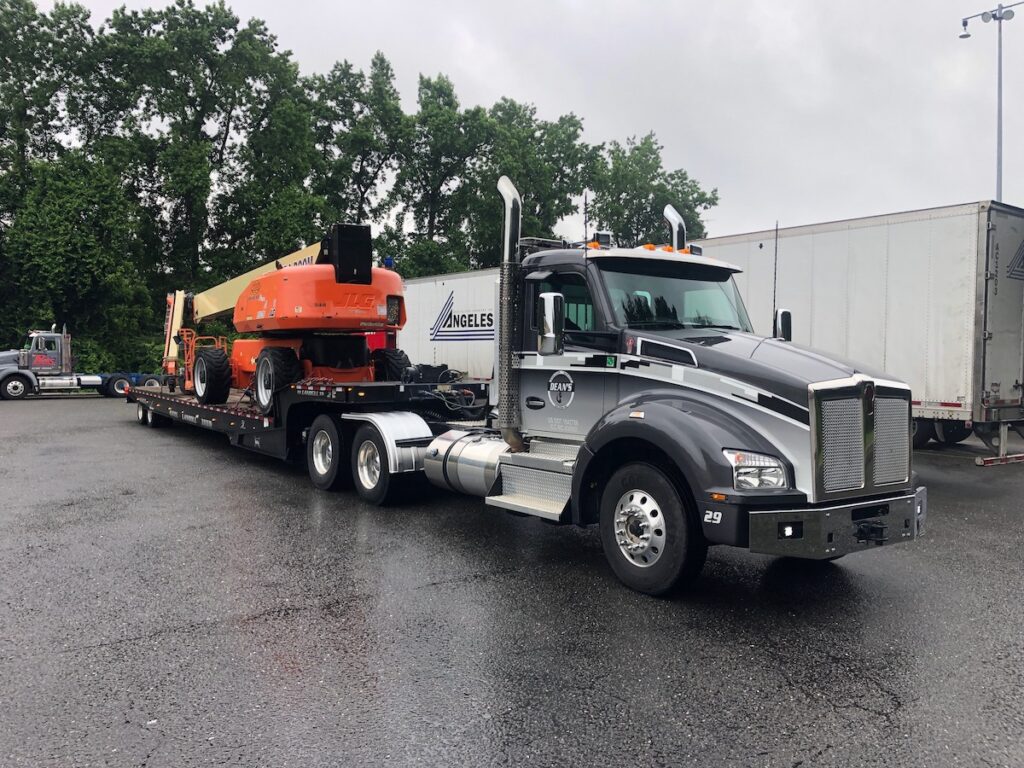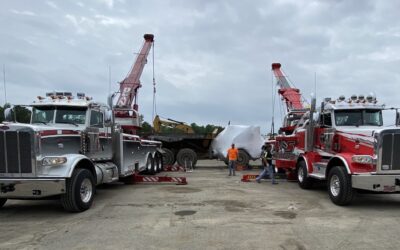Understanding Industrial Transporting

Industrial transporting is when Dean’s Wrecker Service helps your company move goods, materials, and equipment necessary for industrial operations using our team of trucks.
Key Components of Industrial Transporting
- Types of Industrial Transport:
- Road Transport: Utilizes trucks and trailers for flexible and relatively quick transportation over short and medium distances.
- Rail Transport: Suitable for large quantities of goods over long distances, offering cost efficiency and reduced environmental impact.
- Maritime Transport: Ideal for international shipping of heavy and bulky goods; includes container ships, bulk carriers, and tankers.
- Air Transport: Used for high-value, time-sensitive goods, offering the fastest transit times.
- Pipeline Transport: Specifically for transporting liquids and gases over long distances, such as oil, natural gas, and chemicals.
- Logistics and Supply Chain Management:
- Planning and Coordination: Effective transport logistics require meticulous planning and coordination to ensure timely delivery and optimal use of resources.
- Warehousing and Storage: Facilities for storing goods before, during, and after transport play a crucial role in the supply chain.
- Inventory Management: Keeping track of stock levels, ensuring the right quantity of goods is transported to meet demand without overstocking.
- Transportation Modes and Equipment:
- Heavy Haul Trucks: Used for oversized and overweight cargo that standard trucks cannot handle.
- Flatbed Trailers: Suitable for large machinery, construction materials, and other oversized items.
- Tankers: Designed for transporting liquids, such as fuel, chemicals, and food-grade liquids.
- Containers and Intermodal Transport: Standardized containers allow seamless transfer between ships, trains, and trucks.
- Regulations and Compliance:
- Safety Standards: Adherence to safety regulations to prevent accidents and ensure the protection of goods and personnel.
- Environmental Regulations: Compliance with laws aimed at reducing the environmental impact of transportation, such as emissions standards.
- Customs and Trade Compliance: For international transport, understanding and complying with customs regulations and trade agreements is crucial.
- Technology and Innovation:
- GPS and Telematics: Real-time tracking of shipments and vehicle diagnostics to improve efficiency and safety.
- Automation and Robotics: Use of automated systems for loading, unloading, and warehousing to reduce labor costs and increase speed.
- Data Analytics: Leveraging data for route optimization, demand forecasting, and improving overall logistics operations.
Benefits of Efficient Industrial Transporting
- Cost Savings: Efficient transport systems reduce operational costs and improve profit margins.
- Improved Customer Satisfaction: Timely and reliable delivery of goods enhances customer satisfaction and loyalty.
- Competitive Advantage: Companies with efficient logistics and transport systems can respond more quickly to market demands and gain a competitive edge.
- Sustainability: Adopting efficient transport practices can reduce environmental impact and support sustainability goals.
Industrial transporting is a complex and essential aspect of modern industrial operations. It requires careful planning, adherence to regulations, and the use of advanced technologies to ensure that goods are moved efficiently, safely, and cost-effectively. Contact Dean’s Wrecker Service today for help with your companies Industrial Transporting needs!
Recent Posts
Categories
- Auto Towing Raleigh (23)
- Car Maintenance Tips (2)
- Crane Service (1)
- Dean's Wrecker Service (4)
- Equipment Relocation (2)
- Heavy Duty Towing (13)
- Raleigh Highways (3)
Tags
540 Highway
Avoid a Tow with These Tips
Busiest Raleigh Highways
Car Emergency
Car Emergency Items
Car Towing
Car Towing Company
Car Towing Tips
Common Spring Vehicle Problems
Crane Services
Driving in Hazardous Winter Weather
Electric Car Towing
Equipment Hauling Guide
Equipment Relocation
EV Towing
Heavy Duty Towing
Heavy Duty Towing Company
Heavy Duty Wrecker
Heavy Hauling
Heavy Machinery
Hybrid Vehicle Towing
I-540
I-540 Loop
Industrial Transporting
Information About Interstate 540
Interstate 40
Interstate 440
Interstate 540
Prevent Vehicle Form Breaking Down
Quickest Way to Get Your Car Towed
Raleigh Auto Towing
Raleigh Towing
Raleigh Towing Options if Your Car Breaks Down
Roadside Assistance Tips
Road Trip
Spring Vehicle Tips
Summer Car Maintenance Tips to Avoid a Breakdown
Towing Electric & Hybrid Vehicles
Towing Industrial Machines
Towing Insurance
Towing Large Industrial Machines
Tractor-trailer towing
What is Heavy Duty Towing
Winter Car Tips
Winter Driving Myths
